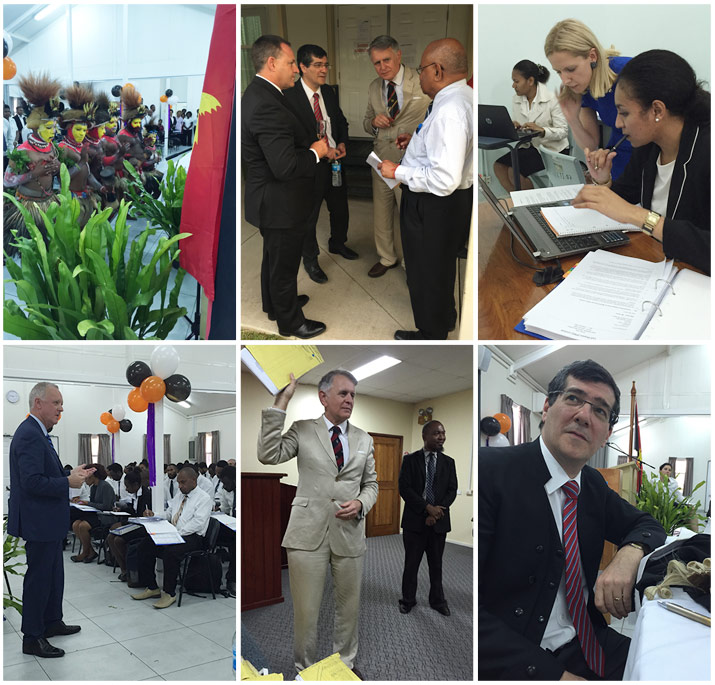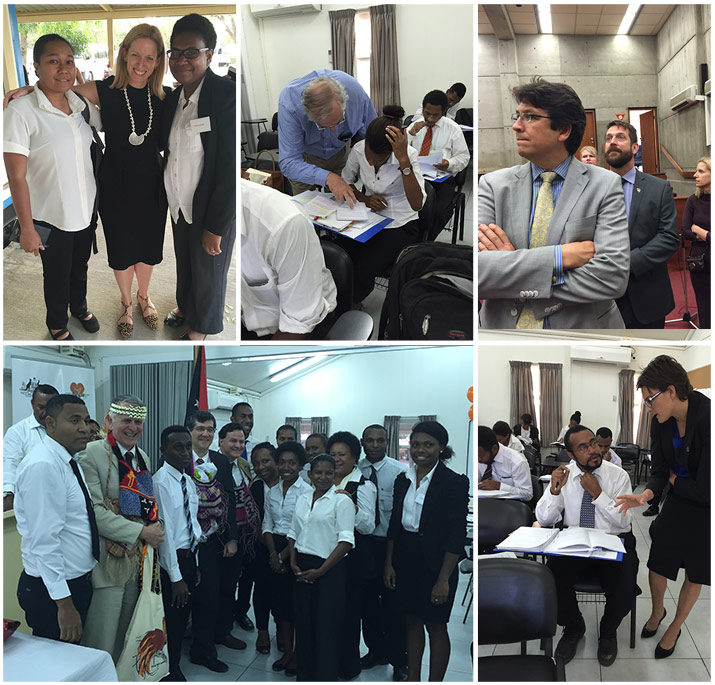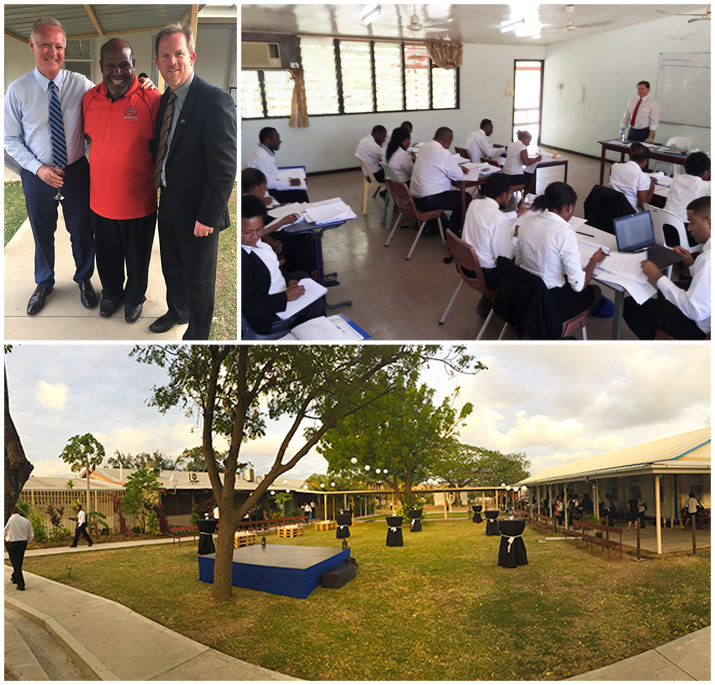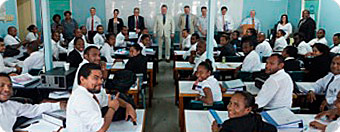In the second week of September 2015 a group of eleven barristers from the Queensland Bar travelled to Papua New Guinea to conduct the 3rd annual Commercial Litigation Workshop. The Group was ably led by Andrew Crowe QC, who took over the mantle of Chair of the South Pacific Region Legal Education Committee after John Bond QC’s appointment to the Supreme Court.
The workshop forms part of the PNG Legal Training Institute’s (LTI) one-year compulsory course of practical legal training, which all law graduates must undertake. The workshop was the brainchild of PNG Chief Justice Sir Salamo Ingia and spearheaded in Queensland by Justice John Logan, who holds commissions on both the Federal Court of Australia and the PNG Supreme and National Courts. The workshop has been running since 2013.
The Working Group
The LTI class that the Queenslanders were to teach was slightly smaller than 2014’s 110 students. This year it was a more manageable 95 students. These students were broken up into 6 groups of approximately 15 each. Barristers were allocated as mentors to each group and stayed with that group throughout the workshop.
The Queensland Bar Association was represented by Andrew Crowe QC, Richard Perry QC, Manuel (Mal) Varitimos QC, Andrew Skoien, Bernard Porter, Karen Carmody, Mark Steele, Erin Longbottom, Joseph Crowley and Holly Blattman.
These happy few conducted lectures in relation to: interlocutory applications, drafting pleadings, preparation for trial, judicial review; discovery and appeals.
The group, who donated their time, flew out of Brisbane on Sunday 6 September and conducted the four-day course at the LTI campus in Waigani (the suburb of Port Moresby which includes the Parliament, the Courts and the university).
This year Justice Logan, who had completed his sittings in the PNG Supreme Court, was able to attend every day of the workshop as well as deliver a lecture to the students. The class was thrilled to have such a senior judicial officer explaining how to approach litigation.

The Workshop
The workshop ran for four days with classes beginning at 8am and finishing at about 4.30 pm. Each morning at 7:30am the Queenslanders were ferried in a secure bus from downtown Port Moresby where they were staying, to the LTI campus. With there being functions on after classes on some nights, the teaching week was a long one.
Each day consisted of lectures delivered by barristers after which students would retire to their groups to work through a practical problem with the assistance of the barristers.
Opening Ceremony
On the opening day the workshop began with a traditional welcoming ceremony complete with tribal dancers in their traditional regalia. Both national anthems were played and the students sung both with gusto. Further, PNG has a National Pledge, which the student recited.
The Director of the LTI, Pauline Mogish, gave a speech in which she stated that the Queenslander’s combined legal experience was “more than 1000 years”. Possibly that was an exaggeration although Crowe, Perry and Carmody are older than they look and Varitimos is a veritable baby face.
Michael Sloane, the Law and Justice Counsellor from the Australian High Commission, told the students that the “range of legal talent” that the Queensland Bar had sent was “staggering”. Obviously such fulsome praise is difficult to respond to but Crowe QC has never shrunk from a challenge. He happily bathed in the warm glow of appreciation on behalf of the Queenslanders but said all were honoured to provide whatever assistance they could. The workshop was officially opened by Deputy Chief Justice Sir Gibbs Salika (the Chief Justice being out of the country).
Both the students and the members of the Queensland Bar then jumped straight into the very full program.

Teaching at the LTI
Classes were conducted from 8:30am to 4:30pm Monday to Thursday primarily in the main building erected on the LTI campus in 2013. It is a large spacious white hall that contains offices and a meeting room at one end. The teaching area accommodated the 95 students in air-conditioned comfort. Further the large teaching space could quickly be divided into three smaller tutorial rooms where Perry and Blattman, Crowe and Carmody took their groups for the practical sessions.
By now most of the LTI is air-conditioned (it having been renovated and added to over the last few years). However, two groups (Varitimos/ Crowley and Steele/ Porter) were housed in old classrooms, which only had ceiling fans. Porter (who grew up in Bundaberg) and Steele (whose primary schooling was in Darwin) had no trouble adjusting to the heat. Varitimos (of Greek heritage) and Crowley (who hails from the Ascot of the western suburbs; Kenmore), did not adjust as quickly.
Varitimos and Crowley began the workshop with a lecture on interlocutory injunctions. Carmody seemed more interested in the topic than most students and posed some curly questions to the speakers.
Both Porter and Longbottom were new-comers to the workshop and were presenting papers for the first time. Longbottom juniored Skoien and Steele in a lecture on trial preparation, including an interesting discussion on the court rules in relation to inspecting real property. As one of the few barrister who had had experience with interrogatories, Perry QC was invited to speak to the students about their utility.
Porter and Carmody presented a paper on Discovery originally written by Ken Barlow QC in 2013. Porter’s lecture, like the Hawaiian shirt he donned several times, had a flair all its own.
Varitimos, with his vast experience in PNG law, was the mainstay of the program delivering several lectures and was the author of the practical problem the students grappled with for the week.
Crowe and Blattman conducted lectures on pleadings generally and pleading a defence. Logan J and Perry rounded off the workshop with a lecture on appeals.
Touch Football
The Commercial Litigation Workshop has developed a tradition of playing touch football (or occasionally soccer) with the students in the one hour lunchtime recess. The members of the 3rd annual workshop maintained this important pedagogical tool. Papua New Guineans love their rugby league so understandably this game attracted much interest from the students; both male and female.
The LTI campus is set in a large, flat, grassy block which comfortably accommodated the game in an open space behind the main hall (often watched by amused locals). Crowley and Blattman were the mainstay of the game which was conducted with a ball later donated by the Queenslanders to the LTI for subsequent use by the students. Skoien and Longbottom made special guest appearances off the bench.
The main deterrent for the Queenslanders was the lack of suitable changing facilities. Allowing for the heat of the PNG dry season; Skoien, Longbottom, Crowley and Blattman had sensibly brought gym gear to play in but the difficulty was showering and changing afterwards in the public toilets on campus. One member of the LTI staff discovered more about Skoien then he cared to know.
Court Visit
Being driven door to door in a secure bus did not give the Queenslanders much opportunity to understand the life of the average Papua New Guinean lawyer. However, Justice Logan organized to take the Queenslanders through the court complex where the privations of everyday litigation in PNG was forcibly brought home to the group. The amount of litigation has outstripped the currently available court space. The original court complex was opened by Her Majesty in 1974 and in the intervening years several demountable buildings have sprung up around it attached to the main building via a covered walk way (for the rainy season).
These courtrooms were old and tired looking. However, they were well air-conditioned and had plenty of space. It was the judges’ chambers that were small. The rise in litigation has seen a rise in members of the judiciary. As with the lack of courtrooms, there is a desperate need for more office space. Some judges have to work two or three to a room during appeal sittings. Despite the privations, the Supreme and National Courts of PNG efficiently dispose of a lot of litigation.
Justice Logan showed the group plans of the extension to the court complex, construction of which is due to commence in 2016. Further, the Queensland Bar was shown the efforts to which the registry was going to digitize its files to increase efficiency and space.

Social Events
Besides teaching during the day, there were social engagements attended by the Queensland Bar representatives. The staff of the LTI took the Queensland contingent out to dinner at Fugui Chinese Restaurant on Wednesday 9 September by way of saying ‘thank you’. Several distinguished guests attended including Justice Sir Bernard Sakora, Deputy Chief Justice Sir Gibbs Silika and Dean of the UPNG Law School Professor Mange Matui.
Sir Gibbs entertained those at his table with stories of his recent investiture at Buckingham Palace by Princess Anne (Her Majesty being on an official visit to Germany at the time). He also revealed that he had an interesting connection to Queensland, having been involved in the Torres Strait Regional Sea native title claim (Akiba) in which his tribe asserted their customary rights and interests in the area the subject of the litigation (the waters between Queensland and PNG).
Michael Sloane of the Australian High Commission also organized a dinner at the PNG Yacht Club for the Queenslanders. The influx of money into the PNG economy from large LNG gas projects is evidenced by the amount of construction going in Port Moresby. The area on the harbor adjacent to the yacht club is one such example though the yacht club itself is not a new building having been erected in the 1980’s. Mr Sloane kindly organized for the group to dine in the ‘members-only’ restaurant at the club.
The High Commission Drinks
The arrival of the Queensland contingent usually prompts a gathering of Australians in PNG and Papua New Guineans who are working in the law and justice sector. In the past this gathering has been hosted by the High Commissioner at her official residence. However, this September found the Acting High Commissioner committed to official duties relating to the Pacific Leaders’ Forum and the Residence under renovation, so the drinks were hosted by the staff of the Australian High Commission at the High Commission building itself. Members of the Australian Federal Police and other lawyers imbedded with PNG prosecutors or in the Attorney General department, Sir Barnard Sekora, by now Acting as Chief Justice, the PNG Ombudsman, the PNG Public Solicitor, LTI staff and others raised a glass with the Queensland contingent in the spacious foyer of the High Commission building with its beautiful art but lack of discernable air conditioning.
Criminal Practice Session
The Commercial Law and Litigation Workshop has always finished with a one day intensive on criminal practice skills. As such, on Friday 11 September Soraya Ryan QC (who joined the group the day before) led Joseph Crowley in conducting this session. After a brief lecture from Ryan and Crowley, the students broke into working groups to talk through a practical problem. The problems the students tackled were originally written by Peter Callaghan SC (who was a member of the 2013 party) and dealt with domestic violence and intimate partner homicide. Unfortunately, life in PNG is such that the students will inevitably confront such issues in their professional lives if not in their personal lives.
On that Friday, those barristers not involved in the criminal practice session toured in Bomana War Cemetery on the outskirts of Port Moresby. The cemetery is maintained by the Office of Australian War Graves on behalf of the Commonwealth War Graves Commission. It contains the graves of 3,824 members of different Commonwealth forces but predominantly Australians. These men and women died in PNG, Bougainville and the Solomon Islands during the Second World War. Another 750 members of the Australian Army, RAAF, Merchant Navy and Papua New Guinea Constabulary who died in these theatres of operations and have no known grave are commemorated on a memorial overlooking the cemetery.
Justice Logan acted as the group’s guide. His Honour has a keen interest in military history and briefed the group on several soldiers buried there, including Queensland lawyer (Lt Charles Groves) and two Victoria Cross recipients (Cpl John French and Private Bruce Kingsbury).
Closing Ceremony
The Queenslanders were honoured by the participation of the students and staff of the LTI in a closing ceremony for the program. Each student was given a certificate of participation, which was presented to them by the member of the Bar who had tutored their group. Each group then gave gifts to the barristers who had instructed them for the week. The Queenslander’s received pottery, wooden masks or bowls and woven bags. A vote of thanks to the barristers was offered by Renee Siaguru, who was one of the top students in the course. She reminded her class mates that “our country needs our contribution” and that “the belief of the Queensland Bar lecturers that you have ability, should be an inspiration to you”.
Sir Barnard Sekora the Acting Chief Justice gave an address to officially close the workshop. In a wide-ranging speech, Sir Barnard began with the Queensland Annexation of Papua in the 1880’s and covering legal luminaries such as Sir Gerard Brennan who appeared in the Mamel trial in Rabaul in 1970, Sir Harry Gibbs and Rob O’Regan QC who lectured at UPNG and Sir Buri Kidu, PNG’s first Chief Justice who graduated in law from the University of Queensland. Sir Bernard also identified the difference between Queensland and PNG practice, in particular the impact that the fused profession has had on legal practice in Papua New Guinea.
Conclusion
On the final night Mal Varitimos hosted a dinner for Crowe’s 60th birthday including an enormous cake that Varitimos had organized the restaurant staff to prepare. Also in attendance were two students who had completed the workshop in 2014. These young women, now admitted solicitors, were very complimentary about the benefits of what they had learned from the Queensland barristers the previous year (they were being shouted dinner).
In all, despite the slings and arrows of outrageous fortune encountered in traveling and in organizing an intensive workshop remotely, the week-long program went off well and the feedback received by the students was very positive.
Conducting the workshops has only been possible because of funding received through the Department of Foreign Affairs and Trade under the Papua New Guinea-Australia Law & Justice Partnership Program. It is hoped that this funding continues. Further, the work done on the ground in PNG by the High Commission (assisted by Cardno) greatly assists the smooth running of the workshop.
The Queensland Bar has plans to send another contingent to PNG to run a 4th Commercial Litigation Workshop in September 2016. We have learned that teaching at the LT1 requires a particular set of skills that we are still developing. For this reason we rely on barristers attending the workshop on an annual basis where possible. Of course, having said that, there will likely be some positions available for new participants in the workshop in 2016.
Joseph Crowley
South Pacific Correspondent






